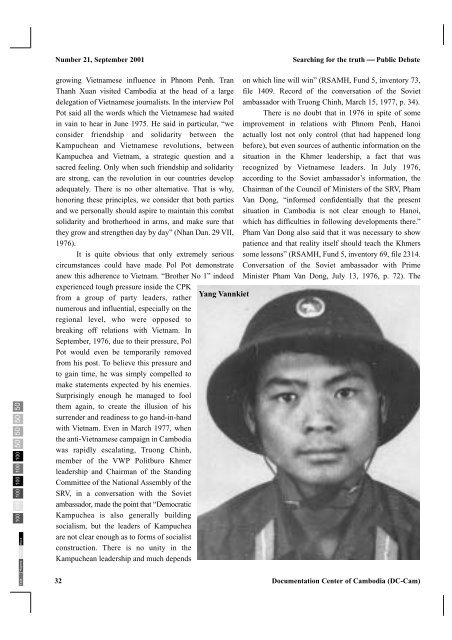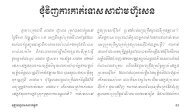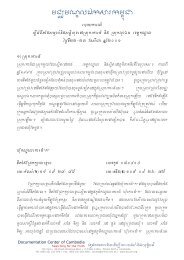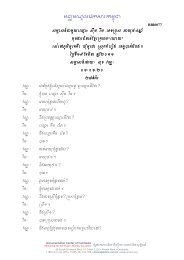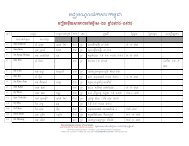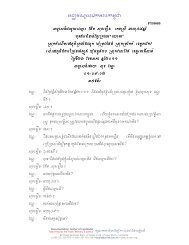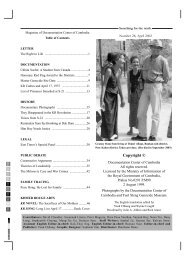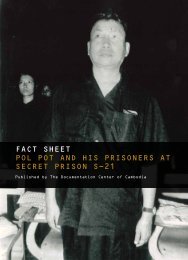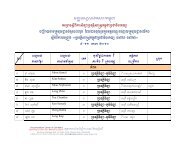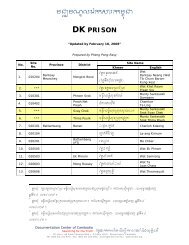Searching for the truth Issues 21 - Documentation Center of Cambodia
Searching for the truth Issues 21 - Documentation Center of Cambodia
Searching for the truth Issues 21 - Documentation Center of Cambodia
Create successful ePaper yourself
Turn your PDF publications into a flip-book with our unique Google optimized e-Paper software.
100 100 100 100 100 100 50 50 50 50<br />
Black<br />
Yellow<br />
Magenta<br />
Cyan<br />
Number <strong>21</strong>, September 2001<br />
growing Vietnamese influence in Phnom Penh. Tran<br />
Thanh Xuan visited <strong>Cambodia</strong> at <strong>the</strong> head <strong>of</strong> a large<br />
delegation <strong>of</strong> Vietnamese journalists. In <strong>the</strong> interview Pol<br />
Pot said all <strong>the</strong> words which <strong>the</strong> Vietnamese had waited<br />
in vain to hear in June 1975. He said in particular, “we<br />
consider friendship and solidarity between <strong>the</strong><br />
Kampuchean and Vietnamese revolutions, between<br />
Kampuchea and Vietnam, a strategic question and a<br />
sacred feeling. Only when such friendship and solidarity<br />
are strong, can <strong>the</strong> revolution in our countries develop<br />
adequately. There is no o<strong>the</strong>r alternative. That is why,<br />
honoring <strong>the</strong>se principles, we consider that both parties<br />
and we personally should aspire to maintain this combat<br />
solidarity and bro<strong>the</strong>rhood in arms, and make sure that<br />
<strong>the</strong>y grow and streng<strong>the</strong>n day by day” (Nhan Dan. 29 VII,<br />
1976).<br />
It is quite obvious that only extremely serious<br />
circumstances could have made Pol Pot demonstrate<br />
anew this adherence to Vietnam. “Bro<strong>the</strong>r No 1” indeed<br />
experienced tough pressure inside <strong>the</strong> CPK<br />
from a group <strong>of</strong> party leaders, ra<strong>the</strong>r<br />
numerous and influential, especially on <strong>the</strong><br />
regional level, who were opposed to<br />
breaking <strong>of</strong>f relations with Vietnam. In<br />
September, 1976, due to <strong>the</strong>ir pressure, Pol<br />
Pot would even be temporarily removed<br />
from his post. To believe this pressure and<br />
to gain time, he was simply compelled to<br />
make statements expected by his enemies.<br />
Surprisingly enough he managed to fool<br />
<strong>the</strong>m again, to create <strong>the</strong> illusion <strong>of</strong> his<br />
surrender and readiness to go hand-in-hand<br />
with Vietnam. Even in March 1977, when<br />
<strong>the</strong> anti-Vietnamese campaign in <strong>Cambodia</strong><br />
was rapidly escalating, Truong Chinh,<br />
member <strong>of</strong> <strong>the</strong> VWP Politburo Khmer<br />
leadership and Chairman <strong>of</strong> <strong>the</strong> Standing<br />
Committee <strong>of</strong> <strong>the</strong> National Assembly <strong>of</strong> <strong>the</strong><br />
SRV, in a conversation with <strong>the</strong> Soviet<br />
ambassador, made <strong>the</strong> point that “Democratic<br />
Kampuchea is also generally building<br />
socialism, but <strong>the</strong> leaders <strong>of</strong> Kampuchea<br />
are not clear enough as to <strong>for</strong>ms <strong>of</strong> socialist<br />
construction. There is no unity in <strong>the</strong><br />
Kampuchean leadership and much depends<br />
32<br />
Yang Vannkiet<br />
<strong>Searching</strong> <strong>for</strong> <strong>the</strong> <strong>truth</strong> ⎯ Public Debate<br />
on which line will win” (RSAMH, Fund 5, inventory 73,<br />
file 1409. Record <strong>of</strong> <strong>the</strong> conversation <strong>of</strong> <strong>the</strong> Soviet<br />
ambassador with Truong Chinh, March 15, 1977, p. 34).<br />
There is no doubt that in 1976 in spite <strong>of</strong> some<br />
improvement in relations with Phnom Penh, Hanoi<br />
actually lost not only control (that had happened long<br />
be<strong>for</strong>e), but even sources <strong>of</strong> au<strong>the</strong>ntic in<strong>for</strong>mation on <strong>the</strong><br />
situation in <strong>the</strong> Khmer leadership, a fact that was<br />
recognized by Vietnamese leaders. In July 1976,<br />
according to <strong>the</strong> Soviet ambassador’s in<strong>for</strong>mation, <strong>the</strong><br />
Chairman <strong>of</strong> <strong>the</strong> Council <strong>of</strong> Ministers <strong>of</strong> <strong>the</strong> SRV, Pham<br />
Van Dong, “in<strong>for</strong>med confidentially that <strong>the</strong> present<br />
situation in <strong>Cambodia</strong> is not clear enough to Hanoi,<br />
which has difficulties in following developments <strong>the</strong>re.”<br />
Pham Van Dong also said that it was necessary to show<br />
patience and that reality itself should teach <strong>the</strong> Khmers<br />
some lessons” (RSAMH, Fund 5, inventory 69, file 2314.<br />
Conversation <strong>of</strong> <strong>the</strong> Soviet ambassador with Prime<br />
Minister Pham Van Dong, July 13, 1976, p. 72). The<br />
<strong>Documentation</strong> <strong>Center</strong> <strong>of</strong> <strong>Cambodia</strong> (DC-Cam)


